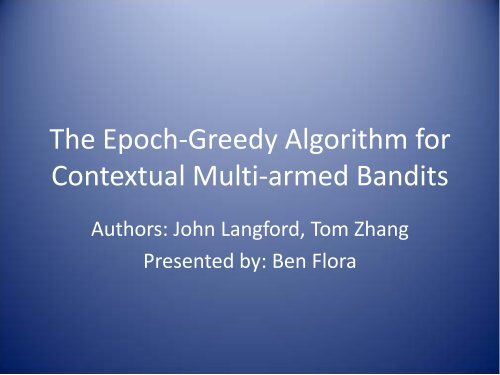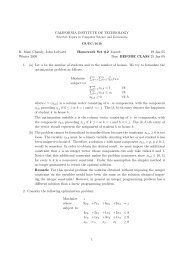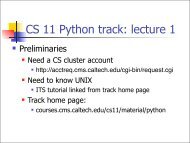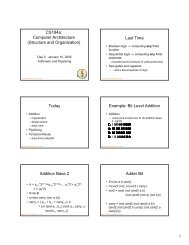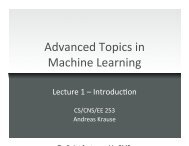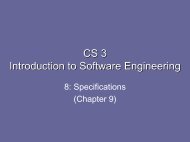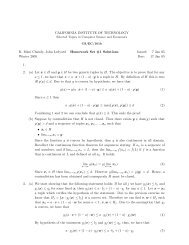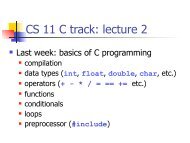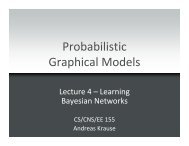The Epoch-Greedy Algorithm for Contextual Multi-armed Bandits
The Epoch-Greedy Algorithm for Contextual Multi-armed Bandits
The Epoch-Greedy Algorithm for Contextual Multi-armed Bandits
You also want an ePaper? Increase the reach of your titles
YUMPU automatically turns print PDFs into web optimized ePapers that Google loves.
<strong>The</strong> <strong>Epoch</strong>-<strong>Greedy</strong> <strong>Algorithm</strong> <strong>for</strong><br />
<strong>Contextual</strong> <strong>Multi</strong>-<strong>armed</strong> <strong>Bandits</strong><br />
Authors: John Lang<strong>for</strong>d, Tom Zhang<br />
Presented by: Ben Flora
Overview<br />
• Bandit problem<br />
• <strong>Contextual</strong> bandits<br />
• <strong>Epoch</strong>-<strong>Greedy</strong> algorithm
Overview<br />
• Bandit problem<br />
• <strong>Contextual</strong> bandits<br />
• <strong>Epoch</strong>-<strong>Greedy</strong> algorithm
<strong>Bandits</strong><br />
• K arms each arm i<br />
– Wins (reward 1) with probability p i<br />
– Looses (reward 0) with probability 1- p i<br />
• Exploration vs. Exploitation<br />
– Exploration is unbiased<br />
– Exploitation is biased by exploration only<br />
• Regret<br />
– Max return – Actual return
Web Example<br />
• Some number of ads that can be displayed<br />
– Each ad translates to an arm<br />
• Each ad can be clicked on by a user<br />
– If clicked reward 1 if not reward 0<br />
• Want to have adds clicked as often as possible<br />
– This will make the most money
Overview<br />
• Bandit problem<br />
• <strong>Contextual</strong> bandits<br />
• <strong>Epoch</strong>-<strong>Greedy</strong> algorithm
<strong>Contextual</strong> <strong>Bandits</strong><br />
• Add Context to the bandit problem<br />
– In<strong>for</strong>mation aiding in arm choosing<br />
– Helps know which arm is best<br />
• <strong>The</strong> rest follows the Bandit problem<br />
• Want to find optimal solution<br />
• More useful than regular bandits
Web Problem<br />
• Now we have user in<strong>for</strong>mation<br />
– A user profile<br />
– Search Query<br />
– A users preferences<br />
• Use this in<strong>for</strong>mation to choose an ad<br />
– Better chance of choosing an ad that is clicked on
Overview<br />
• Bandit problem<br />
• <strong>Contextual</strong> bandits<br />
• <strong>Epoch</strong>-<strong>Greedy</strong> algorithm
<strong>Epoch</strong>-<strong>Greedy</strong> Overview<br />
Exploration<br />
(unbiased input)<br />
Context<br />
Black Box:<br />
Trans<strong>for</strong>ms Input<br />
to hypotheses<br />
Hypotheses<br />
(best arm)<br />
Similar idea to the papers<br />
we saw on Thursday
Exploration<br />
• Look at a fixed time horizon<br />
– Time horizon is the total number of pulls<br />
• Choose a number of Exploration steps<br />
n steps<br />
Exploration<br />
T-n Steps<br />
Exploitation<br />
T
Minimizing Regret<br />
• No explore regret = T<br />
• All exploit regret = T<br />
• Some minimum between those points<br />
Regret<br />
T<br />
Regret<br />
T<br />
Regret<br />
T<br />
T<br />
n<br />
T<br />
n<br />
T<br />
n
Creating a Hypotheses<br />
• Simple two <strong>armed</strong> case<br />
• Remember binary thresholds<br />
• Want to learn the threshold value<br />
ε<br />
t<br />
ε<br />
If x < t : pick arm 1<br />
x > t : pick arm 2
Creating a Hypotheses (Cont.)<br />
• Want to be within ε of the threshold<br />
– Need ≈ O(1/ε)<br />
• As the function gets more complex<br />
– Need ≈ O((1/ε)*C)<br />
– C denotes how complex the function is<br />
– A quick note <strong>for</strong> those of you who took 156 the C<br />
is similar to VC dimension
<strong>Epoch</strong><br />
• Don’t always know the time horizon<br />
• Append groupings of known time horizons<br />
– Repeat until time actually ends<br />
• This specific paper has chosen a single<br />
exploration step at the beginning of each<br />
epoch
<strong>Epoch</strong>-<strong>Greedy</strong> <strong>Algorithm</strong><br />
• Do a single step of exploration<br />
– Begin creating an unbiased vector of inputs to<br />
create the hypotheses<br />
– Observe context in<strong>for</strong>mation<br />
• Add the learned in<strong>for</strong>mation to past<br />
exploration and create a new hypotheses<br />
– This uses the contextual data and exploration<br />
• For a set number of steps exploit the<br />
hypotheses arm
Review Using Web Example<br />
• Have a variety of ads that can be shown<br />
– Sports<br />
– Movie<br />
– Insurance
Review (Cont)<br />
• Search Query<br />
– Golf Club Repair<br />
– Randomly choose<br />
– Clicked<br />
• Search Query<br />
– Car Body Repair<br />
– See Repair and Car<br />
– Not Clicked
Review (Cont.)<br />
• Search Query<br />
– Horror Movie<br />
– Randomly choose<br />
– Clicked<br />
• Search Query<br />
– Sheep Movie<br />
– See Sheep and Movie<br />
– Clicked


